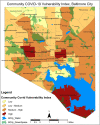Lessons learned to improve COVID-19 response in communities with greatest socio-economic vulnerabilities
- PMID: 37024912
- PMCID: PMC10079160
- DOI: 10.1186/s12889-023-15479-0
Lessons learned to improve COVID-19 response in communities with greatest socio-economic vulnerabilities
Abstract
Background: Vulnerable communities are susceptible to and disproportionately affected by the impacts of the COVID-19 pandemic. Understanding the challenges faced, perceptions, lessons learned, and recommendations of the organizations that provide services in response to COVID-19 to vulnerable communities is critical to improving emergency response and preparedness in these communities.
Methods: This study employed GIS mapping to identify the needs and assets that exist in communities in Baltimore City, where vulnerabilities related to social determinants of health and the burden of the COVID-19 pandemic were greatest. We also conducted an online survey between September 1, 2021, and May 30, 2022, to assess the COVID-19-related services provided by local organizations, challenges faced, perceptions, lessons learned, and recommendations to inform policies, programs, and funding related to improving the COVID-19 response in underserved communities. The survey was disseminated through the online Kobo Toolbox platform to leaders and representatives of organizations in Baltimore City.
Results: Based on GIS mapping analysis, we identified three communities as the most vulnerable and 522 organizations involved in the COVID-19 response across Baltimore City. 247 surveys were disseminated, and 50 survey responses were received (20.24% response rate). Out of these organizations, nearly 80% provided services in response to COVID-19 to the identified vulnerable communities. Challenges experienced ranged from funding (29%), and outreach/recruitment (26%), to not having access to updated and accurate information from local officials (32%).
Conclusions: This research highlights critical insights gained related to the experiences of vulnerable populations and suggests ways forward to address challenges faced during the emergency response by providing recommendations for policy and program changes. Furthermore, the findings will help better prepare vulnerable communities for public health emergencies and build more community resilience.
Keywords: Baltimore City; COVID-19; Community Engagement; Geographic Information System (GIS) mapping; Social Determinants of Health; Vulnerable Communities.
© 2023. This is a U.S. Government work and not under copyright protection in the US; foreign copyright protection may apply.
Conflict of interest statement
The authors declare that they have no competing interests.
Figures
References
-
- Kim SY, Yeniova A. Global, regional, and national incidence and mortality of COVID-19 in 237 countries and territories, January 2022: A systematic analysis for World Health Organization COVID-19 Dashboard.Life Cycle. 2022;/.
-
- Organization WH. COVID-19 Weekly Epidemiological Update. 2020:17.
Publication types
MeSH terms
Grants and funding
LinkOut - more resources
Full Text Sources
Medical




